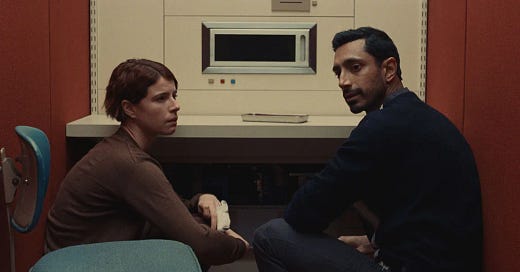Fingernails
Jessie Buckley and Riz Ahmed star in this dystopian romance about using science to determine if couples really belong together -- a movie you may have trouble falling in love with.
“Fingernails” debuts on Apple TV+ Nov. 3.
You remember those love testers machines seen at fairs or arcades? You’d grab a handle or other doohickey and it would tell you how much sex appeal you possessed, or even if your current partner truly was in love with you — or just playing a game with your heart.
The premise of “Fingernails” takes this to a literal, and tragic, conclusion.
Set in a dystopian present, it’s about a world in which scientists have discovered a way to determine using machines if a couple are truly in love, i.e. meant to be together. Two workers at an institute find themselves drawn to each other despite being positively matched with someone else, throwing into question the veracity of the entire enterprise.
The film from writer/director Christos Nikou (“Apples”) stars Jessie Buckley and Riz Ahmed, two of the most interesting and talented young actors of the day, both recent Oscar nominees. I’m especially a big fan of the work of Buckley, a true cinematic chameleon who makes drastic changes both emotionally and physically between her characters.
Unfortunately, I had trouble falling in love with this movie.
It’s slow-moving and methodical, failing to grasp the big emotional challenges of living in a world where love is reduced to just another lab test. Its lack of internal logic also makes it hard to suspend disbelief.
Buckley plays Anna, an elementary schoolteacher currently between jobs who secretly yearns to work at the Love Training Institute, the leading company using the relatively new technology that allows a computer to decide if couples are experiencing real, deep love.
She and her longtime boyfriend, Ryan (Jeremy Allen White), took the test themselves three years ago and were a 100% match, aka they both are in love with the other. Since then their life has settled into a peaceful if unexciting routine, and it’s clear Anna is harboring doubts about the test.
Duncan, the founder of the institute played by Luke Wilson, observes the cultural changes wrought by the advent of this technology, with initial results showing that 87% of all couples were mismatched. Most tests showed a 0% positive result, meaning neither partner loved the other. This led to mass breakups and divorce.
Even worse, a few tests showed a 50% match — meaning only one partner is in love with the other.
As a new employee, Anna is partnered with Amir (Ahmed), who’s only been on the job a few months himself but has really shown a knack for this work. They work extensively with couples, putting them through an exhaustive array of tests and observations. This can range from karaoke, seeing if you can sniff out your partner while blindfolded in a roomful of people, and even skydiving.
Then comes the actual test itself, the mechanics of which are just horrifying: each person has a fingernail forcibly ripped out, which are then placed in a microwave-looking device that spins for a few seconds before spitting out the result.
Now, I realize we’re firmly in science fiction territory here. There’s a certain Asimov/Vonnegut playfulness here, positing fanciful possibilities as humdrum routine. This is underscored by the chunky, 1970s-looking machinery the institute uses, complete with monochrome computer displays and big, colored buttons.
But this is not played for laughs, but toe-curling discomfort. The movie makes no attempt to explain why the signs of true love reside in the nail bed, and even if so why it couldn’t be surgically removed with local anesthesia — instead of having people bite down on a wooden dowel to stifle their screams.
Anyway, Anna finds herself drawn to Amir. He’s smart and gentle, with a sardonic sense of humor and readily apparent empathy for their clients. He sees them not as just guinea pigs but people in need of his help. He seems to take every negative test result as a personal defeat.
He has his own test-approved counterpart, Natasha (Annie Murphy), although when Anna meets her she finds the girlfriend curiously unfamiliar with basic facts about her man, such as his dietary needs.
From there, it’s a long, slow burn as the movie finally toddles off to the place we know it will arrive: Anna and Amir finally making plain their feelings for each other. Ryan and Natasha helpfully disappear for most of the middle of the movie to facilitate this gravitational realignment.
I bought Buckley and Ahmed as an onscreen couple; I just wish it was in another story. The movie’s tone is weird and off-putting, seeming unable to decide if it’s engaging in black humor or some big allegory about the unknowableness of our digitized society.
I kept waiting for “Fingernails” to challenge itself and throw the whole notion of love-testers out the window, with the main characters as leaders of the revolution.
Briefly, Anna states that relationships are not something that are just a yay or nay, but needing to be worked on constantly. This light bulb moment quickly disappears, though, and we’re back to using a keratin Easy-Bake Oven to determine our fate.
Although we’ve introduced all sorts of new matchmaking methods to meet each other, there’s no real mystery on how to swipe right for the long-term. Love isn’t something that just is or isn’t; it’s a garden you seed and sow. Without tending, it will eventually wither or grow weeds.
Despite a promising pair of stars and an intriguing premise, “Fingernails” dies on the vine.





